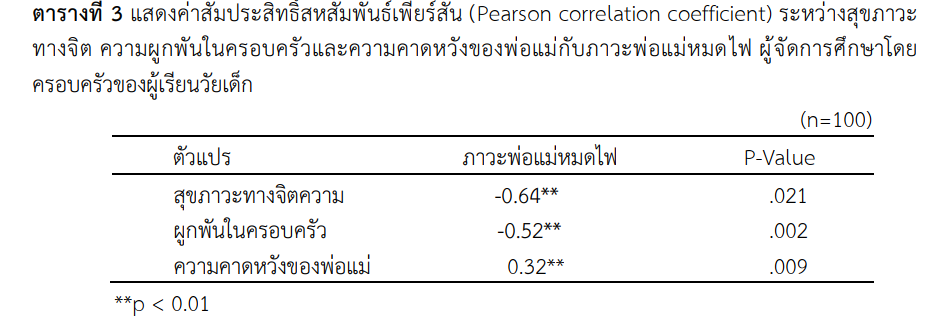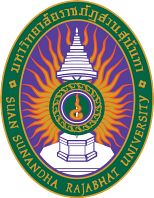Psychological well-being, Family cohesion, and Parental Expectations Relationship with Parental Burnout in Homeschooling Families of Childhood
Keywords:
Homeschooling, Parental burnout, Psychological Well-being, Family cohesionAbstract
The objectives of this study are: 1) To examine the mental health, family attachment, and parental expectations related to parental burnout among parents who manage the education of their young children, and 2) To investigate the relationship between mental health, family attachment, and parental expectations in relation to parental burnout among parents who manage the education of their young children. This research uses a quantitative approach, with a survey and questionnaire as tools to collect data from a sample of 100 parents of children aged 3-12 years, selected sampling formula. The statistical methods used in this study include descriptive statistics such as frequency, percentage, mean, standard deviation, and Pearson correlation.
The research findings the overall level of mental well-being of the respondents was moderate (𝑥̅= 3.15, S.D.= 0.427), the overall family bond effect of the respondents was moderate (𝑥̅= 3.27, S.D.= 0.469), and the overall parental expectation effect was low (𝑥̅= 2.80, S.D.= 0.531). The overall effect of parental burnout was low (𝑥̅= 1.92, S.D.= 0.60). Revealed significant relationships between the studied variables. Parental mental health was negatively correlated with parental burnout, indicating that parents with higher mental health levels tend to experience lower levels of parental burnout. Similarly, family attachment was also negatively correlated with parental burnout, suggesting that strong family bonds and support systems can help prevent parental burnout. On the other hand, parental expectations were positively correlated with parental burnout, meaning that higher expectations may increase the risk of parental burnout.
The findings revealed significant correlations between the studied variables. Parental mental well-being was negatively correlated with parental burnout, indicating that higher levels of mental well-being were associated with lower levels of burnout. Family cohesion was also negatively correlated with parental burnout, suggesting that strong family bonds and support systems can buffer against burnout. Conversely, parental expectations were positively correlated with parental burnout, implying that high expectations can increase the risk of burnout.
References
Barnes, H. L., & Olson, D. H. (1985). Parent–adolescent communication and the Circumplex Model. Child Development, 56(2), 438–447. doi:10.2307/1129732
Creswell, C., O'Connor, T. G., & Brewin, C. R. (2008). The impact of parents' expectations on parenting behaviour: An experimental investigation. Behavioural and Cognitive Psychotherapy, 36(4), 483-490. doi:10.1017/s1352465808004414
Dockery, A. M., Koshy, R., & Li, I. (2022). Parental expectations of children’s higher education participation in Australia. British Educational Research Journal, 48(4), 617-639. doi:10.1002/berj.3786
Hongyantarachai, T. (2022). Basic quantitative analysis in psychology (6th ed.). Bangkok: Ramkhamhaeng University (In Thai).
Kamphuweang, A., & Naerot, P. (2019). The situation of education homeschooling. The Third National Conference on Public Affairs Management, 5, 488-498. Retrieved from https://conference.kku.ac.th/colaimg/files/articles/49bc0-o-42-.pdf (In Thai)
Keyes, C. L. (1998). Social well-being. Social Psychology Quarterly, 61(2), 121-140. Retrieved from https://psycnet.apa.org/doi/10.2307/2787065
Le Vigouroux, S., Scola, C., Raes, M. E., mMikolajczak, M., & Roskam, I. (2017). The big five personality traits and parental burnout: Protective and risk factors. Personality and Individual Differences, 119, 216–219. doi:10.1016/j.paid.2017.07.023
Meesil, N., & Puengposop, N. (2017). Learning from home: The foundations of the life and career skills in the 21st century. Journal of Social Sciences and Humanities, 43(1), 80-98. Retrieved from https://so04.tci-thaijo.org/index.php/socku/article/view/132146/99273 (In Thai)
Office of the Education Council. (2019). National Standard for Early Childhood Care, Development and Education Thailand. Bangkok: Prikwarn Graphic Company Limited (In Thai). Retrieved from https://www.oic.go.th/FILEWEB/CABINFOCENTER17/DRAWER002/GENERAL/DATA0002/00002274.PDF (In Thai)
Osgood, C. E., Suci, G. J., & Tannenbaum, P. H. (1957). The measurement of meaning. Urbana: University of Illinois.
Raudasoja, M. S., & Aunola, K. (2022). Self-esteem, socially prescribed perfectionism, and parental psychological control. Journal of Child and Family Studies, 32, 1113–1120. Retrieved from https://link.springer.com/article/10.1007/s10826-022-02324-y
Ryff, C. D., & Keyes, C. L. (1995). The structure of psychological well-being revisited. Journal of Personality and Social Psychology, 69(4), 719-727. doi:10.1037//0022-3514.69.4.719
Seginer, R., & Mahajna, S. (2018). Future orientation links perceived parenting and academic achievement: Gender differences among Muslim adolescents in Israel. Learning and Individual Differences, 67, 197-208. Retrieved from https://psycnet.apa.org/doi/10.1016/j.lindif.2018.08.009
Srichai, A., Dallas, J. C., & Hengudomsub, P. (2016). Relationships between Family Connectedness, Negative Life Event, Emotional Quotient and Mental Health Status of High School Students. The Journal of Faculty of Nursing Burapha University, 24(4), 65-76. Retrieved from https://he02.tci-thaijo.org/index.php/Nubuu/article/view/82438 (In Thai)
Srijandari, P., & Chomeya, R. (2021). A Study of Components of Adolescent Attachment in Family. Journal of MCU Peace Studies, 9(4), 1594-1602. Retrieved from https://so03.tci-thaijo.org/index.php/journal-peace/article/view/243571/169916 (In Thai)
Supchok, P. (2007). A study on expectation of parents toward educational management at Nakhon pathom vacation college. In Master’s Project, M.Ed. Srinakharinwirot University (In Thai). Retrieved from http://thesis.swu.ac.th/swuthesis/Ed_Adm/Pigul_S.pdf
Supwong, K. (2015). Self-concept, Positive thinking and Psychological well-being: A Canonical Correlational Study. Apheit Journal, 19(2), 81-91. Retrieved from https://so01.tci-thaijo.org/index.php/apheitjournals/article/view/29882/25733 (In Thai)

Downloads
Published
How to Cite
Issue
Section
License
Copyright (c) 2024 Suan Sunandha Rajabhat University

This work is licensed under a Creative Commons Attribution-NonCommercial-NoDerivatives 4.0 International License.
บทความที่ได้รับการตีพิมพ์เป็นลิขสิทธิ์ของ สถาบันวิจัยและพัฒนา มหาวิทยาลัยราชภัฎสวนสุนันทา
ข้อความที่ปรากฏในบทความแต่ละเรื่องในวารสารวิชาการเล่มนี้เป็นความคิดเห็นส่วนตัวของผู้เขียนแต่ละท่านไม่เกี่ยวข้องกับมหาวิทยาลัยราชภัฎสวนสุนันทา และคณาจารย์ท่านอื่นๆในมหาวิทยาลัยฯ แต่อย่างใด ความรับผิดชอบองค์ประกอบทั้งหมดของบทความแต่ละเรื่องเป็นของผู้เขียนแต่ละท่าน หากมีความผิดพลาดใดๆ ผู้เขียนแต่ละท่านจะรับผิดชอบบทความของตนเองแต่ผู้เดียว




